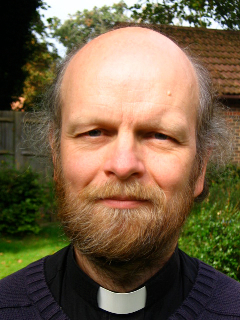Opinion Column

Call yourself a Christian? Or None?
Regular contributor Andy Bryant shares his thoughts on the relevance of the religion statistics in last week’s Census results, and suggests what it means to live up to the identity of being Christian.
Much has been made of the fact that the latest Census data shows that there is no longer a majority of those identifying as Christian. This should not have come as a surprise as the British Attitude Surveys have been showing this for some time.
To be honest, when completing my census return, I gave serious thought to ticking the No Religion box. I often hesitate to self-identify as Christian, not least because of the unhelpful luggage that term so often carries.
Let me be clear: my faith and trust in the Holy and Undivided Trinity is undiminished, but I do struggle with much that is said and done in the name of Christianity and, beyond Church circles, I often feel I have to hedge around any self-identification as a Christian. I know there is much good that Christianity has contributed to the world and it has helped shape for the better the laws of this land and our approach to a welfare state. But these positives are often drowned out but other much more uncomfortable realities, that paint a different picture of the faith we want to proclaim.
In the name of Christianity, slavery was supported and enabled to flourish with a legacy that still casts a terrible shadow on so much of the way the world has developed. In the name of Christianity too many have suffered abuse and the Church has looked the other way. To listen to testimony and findings of the Independent Inquiry into Child Sexual Abuse was profoundly shaming and deeply uncomfortable. Christians have fallen out with each other over a range of issues including the role of women, sexuality, and gender. And the way Christians speak to, and about, each other over these, and other, issues is anything but dignified and often the very opposite of disagreeing well, yet alone any semblance of Christian love.
In these and a host of other ways the Church has too often let down Christ and I am more surprised by the number who still are willing to identify themselves as Christians, rather than the size of the majority who now prefer to identify as having no religion. We have to be honest about the many ways in which Christianity gets in the way of Christ.
Amongst those identifying as "Nones" – no religion – recent research published by the Theos Foundation highlights that whilst about one third are vehemently against all religion, another third has a sense of the Other, a sense of the numinous – may pray, believe in God and in heaven. There remains a strong hunger for the spiritual but increasingly people do not want the unhelpful luggage that comes with a formal religion.
Although we are all guilty of it, hypocrisy is one of the most judged sins of the age. People are wary of those who say one thing and do another. It is one of the most often quoted reposts against Christians that we are hypocrites, preaching a gospel we fail to live out. And one of the reasons we resent the charge is because deep down we know it has a ring of truth. There is too often a gap between the gospel we proclaim and the lives we live – and the way the Church operates. We may want to put our hand up and acknowledge that we are fallen people, fallible and sinful, and that we are all too aware of our need of grace, but all the world sees is our fall and not the grace, they experience our judgement and not our compassion.
All the mission strategies in the world will achieve nothing unless and until the world sees God’s love in action, until the Church gives incarnation to the love of God. During my years in ministry in the Church of England I have watched mission departments grow and social responsibility departments close and in parallel I have watched church attendance decline and social engagement reduce. We talk more and more about mission, evangelism and discipleship and we live it out less and less.
If we want to see our society engage once again with Christianity, we need less talk and more living witness. Communities need to see Christ’s love in action, to see the presence of the Church in our towns and communities making a difference, for people to know the Church is on their side and will be there for them in their time of need. We need to be less concerned about the numbers in the pew and more focused on the depth of our community impact.
We are called to be yeast, salt, and light to those amongst whom we live. In and of themselves small things, but which all have a major impact. We need to be the leavening and the seasoning that truly enhances the places where we live, the light that brings hope. Only then will the march of the Nones be halted.
The image above is courtesy of pixabay.com
 The Revd Andrew Bryant is the Canon for Mission and Pastoral Care at Norwich Cathedral. He was previously Team Rector of Portishead, Bristol, in the Diocese of Bath and Wells, and has served in parishes in the Guildford and Lichfield Dioceses, as well as working for twelve years with Kaleidoscope Theatre, a charity promoting integration through theatre for young adults with Down’s Syndrome.
The Revd Andrew Bryant is the Canon for Mission and Pastoral Care at Norwich Cathedral. He was previously Team Rector of Portishead, Bristol, in the Diocese of Bath and Wells, and has served in parishes in the Guildford and Lichfield Dioceses, as well as working for twelve years with Kaleidoscope Theatre, a charity promoting integration through theatre for young adults with Down’s Syndrome.
You can read Andrew's latest blog entry here and can follow him via his Twitter account @AndyBry3.
The views carried here are those of the author, not of Network Norwich and Norfolk, and are intended to stimulate good-natured and constructive debate between website users.
We welcome your thoughts and comments, posted below, upon the ideas expressed here.
Click here to read our forum and comment posting guidelines